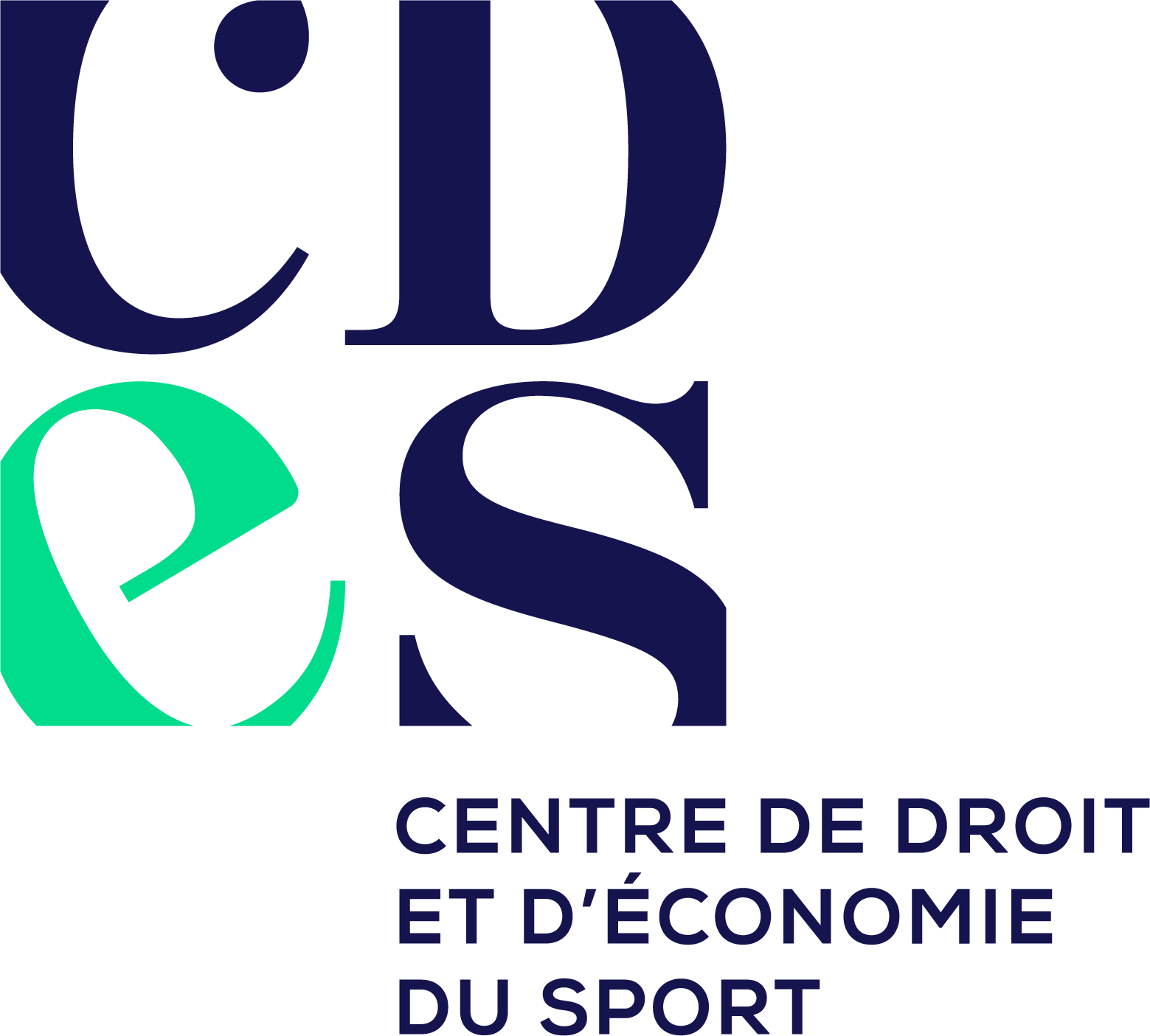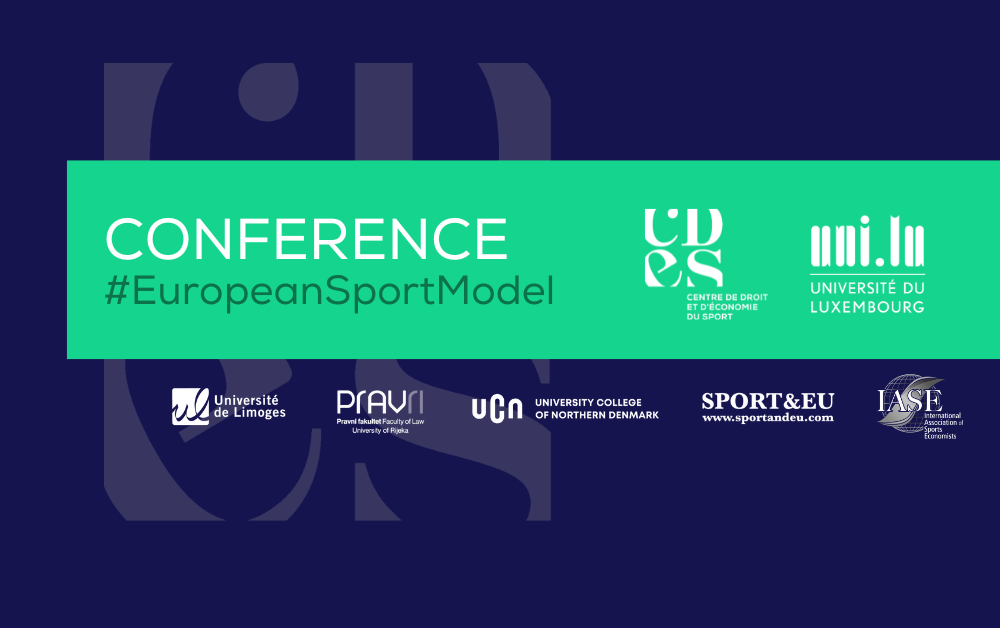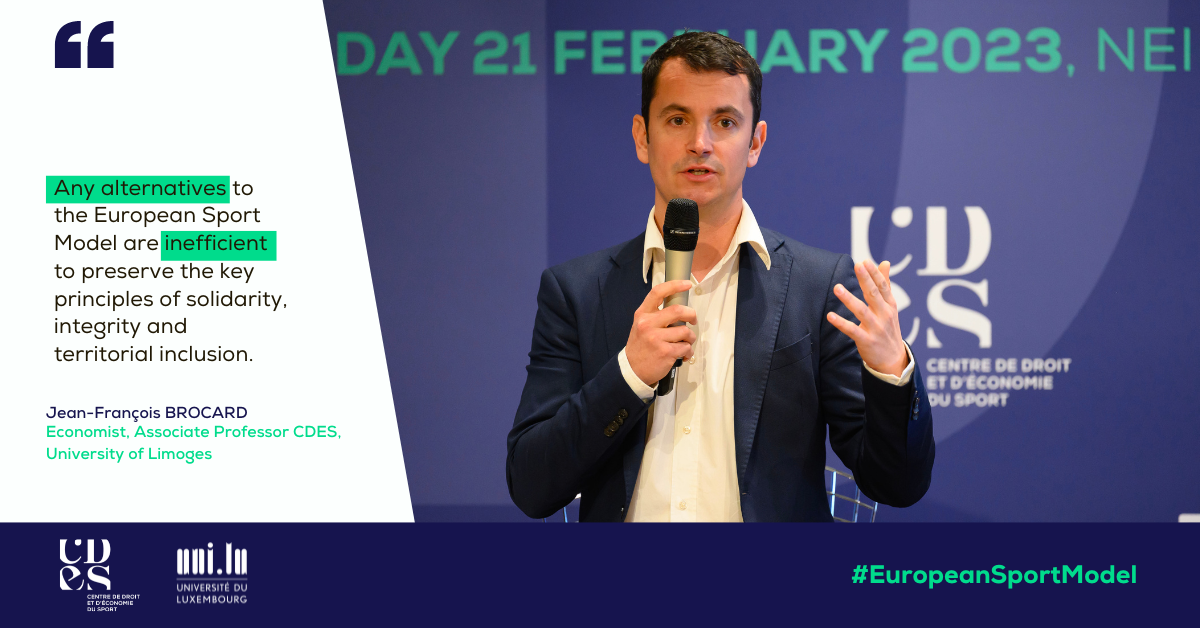On Tuesday 21 February, the Center for Law and Economics of Sport of the University of Limoges (France) and the University of Luxembourg organised a conference with leading economic and legal experts on the organisation of football in Europe, with the support of the Faculty of Law of the University of Rijeka (Croatia), the University College of Northern Denmark, Sport&EU and the International Association of Sport Economists.
Opening statement
The conference was opened at the historic Abbey Neimënster by Thierry Wagner, Coordinator and Member of the Ministerial Cabinet of the Luxembourgish Sport Ministry, Joël Wolff, General Secretary of the Luxembourg Football Federation and Denis Scuto, Deputy Director of the Luxembourg Centre for Contemporary and Digital History at the University of Luxembourg.
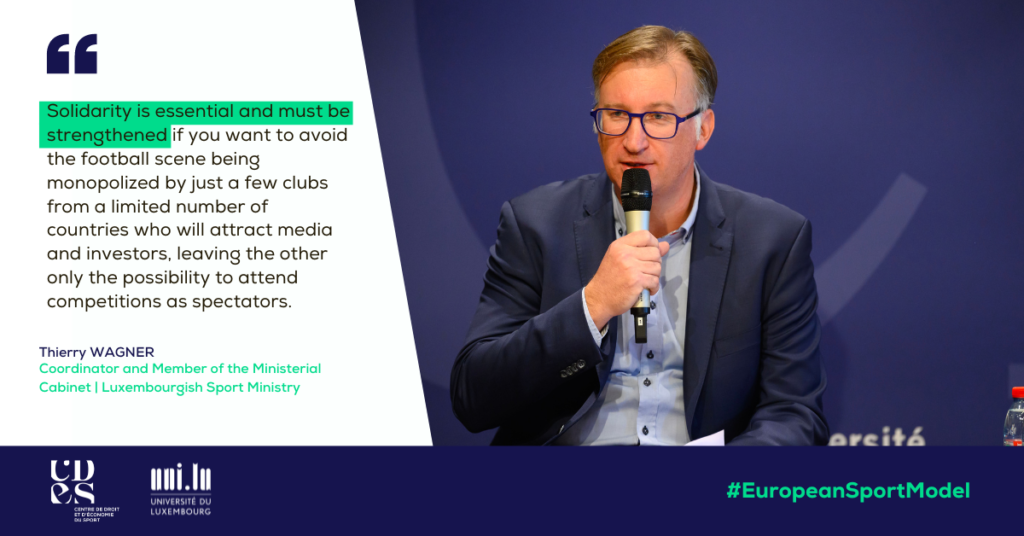
Mr. Wagner noted that Luxembourg has 40,000 licensed players, an impressive number for a country of 650,000 people. He highlighted the importance of the pyramidal structure of football for the training of players, so that talented players are selected by the larger clubs in Luxembourg. Indeed, Luxembourg has successfully developed local players into international players. He highlighted the importance of the national training centre, funded in part by UEFA through its HatTrick programme.
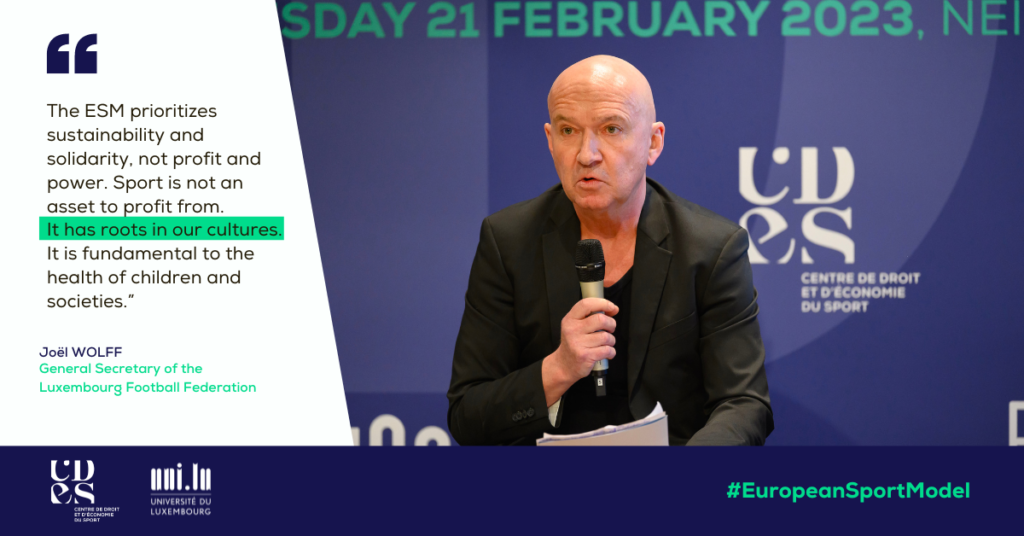
Mr. Wolff stressed the importance of the European Sports Model and the principle of openness of football competitions for the development of football in Luxembourg. In his view, a closed competition reserved to elite clubs would harm Luxembourg, not least because UEFA’s solidarity contributions benefit all clubs in Luxembourg, and not just those competing in UEFA club competitions.
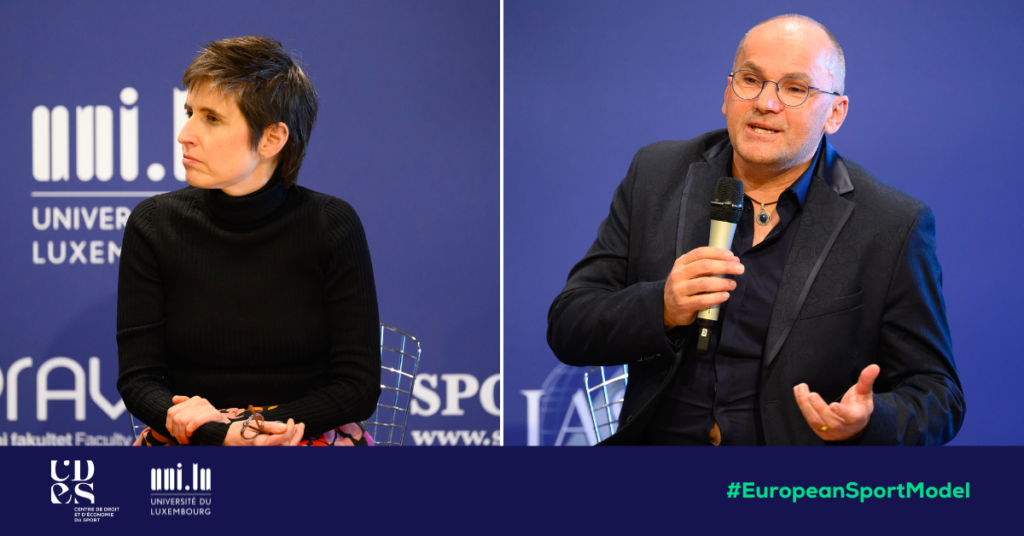
Mr. Scuto picked up on the remarks that football is not just a for-profit activity. Recalling his own training as a young player, he noted that many of his football coaches were steel workers from Italy and Portugal who integrated into Luxembourg through football. He learnt from these men sporting values: authenticity; humility; and solidarity. Success means nothing in sport if I am the only one to be successful, he concluded. These themes set the scene for much of the discussion later in the afternoon.
Setting the Scene: Economic and Legal Themes
Jean Francois Brocard, Economist and associate Professor at CDES, University of Limoges, outlined the economic parameters associated with the European Sports Model. He observed that sport is a specific good and a specific sector that should be treated in a specific manner. Indeed, it is a collective good and many of its benefits to society – health, social and citizenship – cannot be quantified. He contrasted the European Sports Model with the model in North America where franchises make no contribution whatsoever to broader society. Indeed, the franchises do not even contribute to the development of players, free riding instead on the training of players in the university system. A private organiser is simply not interested in looking at the broader impact societal impact of sport. As such, other models such as that proposed by the Super League are less efficient than the European Sports Model.
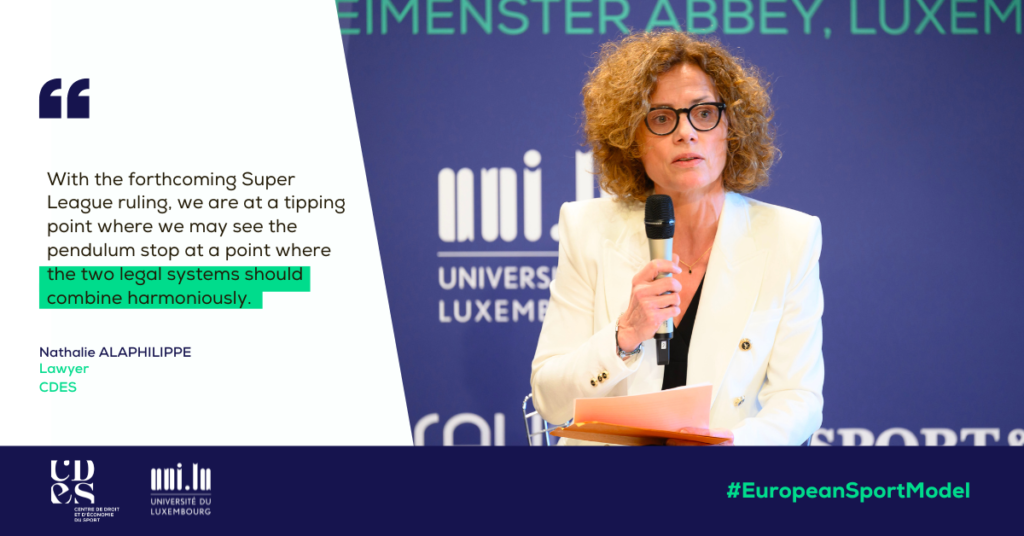
Nathalie Alaphilippe, Lawyer at CDES, then provided an introduction to the legal issues. She noted that the approach of EU law to sport has been like a pendulum, swinging from one extreme to find that EU law did not apply to pure sporting rules in the 1970s case of Walrave & Koch to another extreme in the 2006 judgment of Meca Medina where all sporting activities fall within the scope of EU competition law. The pendulum has been searching for balance. In her view, the European Super League case provides the European Court of Justice with the opportunity to find a harmonious position between EU law and sport. What is at stake is not just the future of football, but all sport.
Panel 1: The European football pyramid: What benefits go with it?
Hosted by Mehreen Khan, Economics Editor of The Times, the first panel addressed the benefits and shortcomings of the European football pyramid.
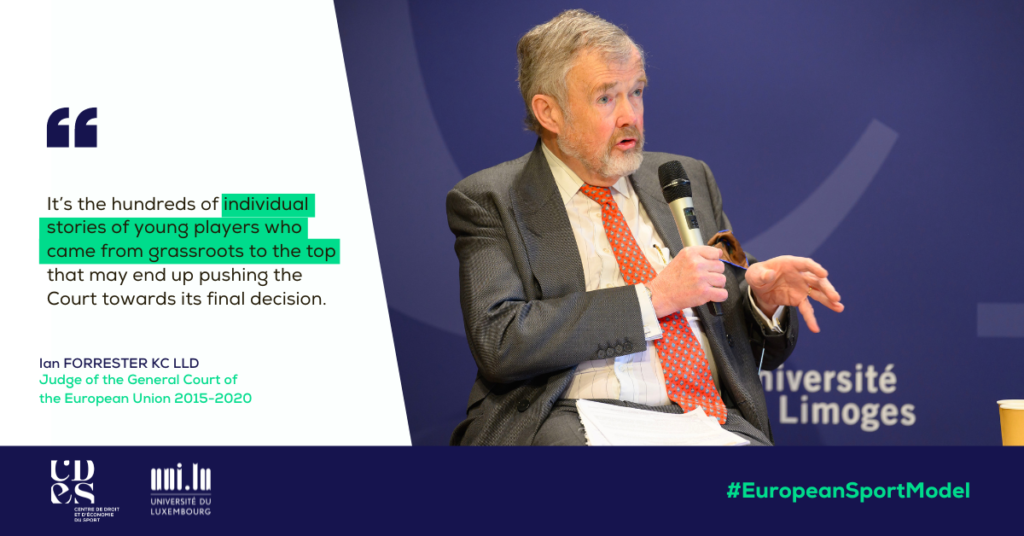
Ian Forrester KC, EU Lawyer and former Judge at the EU General Court (2015-2020), commenced by noting that many aspects of the European Sports Model were obvious: that the wealthy have an interest in the weakest, that the rules of the game should be uniformly applied and that competitions should be open. However, he recalled his experience in the Bosman case to note that these benefits will not be assumed by the Court of Justice in the Super League case. Turning to the Opinion of Advocate General Rantos, he considered it to be weighty. He wondered whether the Court may however consider his proposition as to the constitutional nature of the European Sports Model to be too bold. However, Ian Forrester KC observed that the Court of Justice has on occasions had to fill in the gaps in the Treaty. The 60th anniversary of the seminal Van Gend en Loos judgment (where the EU Court of Justice held that Treaty provisions could have direct effect) is a reminder that the Court of Justice has had to draw out principles in EU law from the political intent of the Treaty. As such, he considered that the inclusion of sport in the Treaty to be a very powerful consideration. It means that the values of the European Sports Model now have their roots in the Treaty.
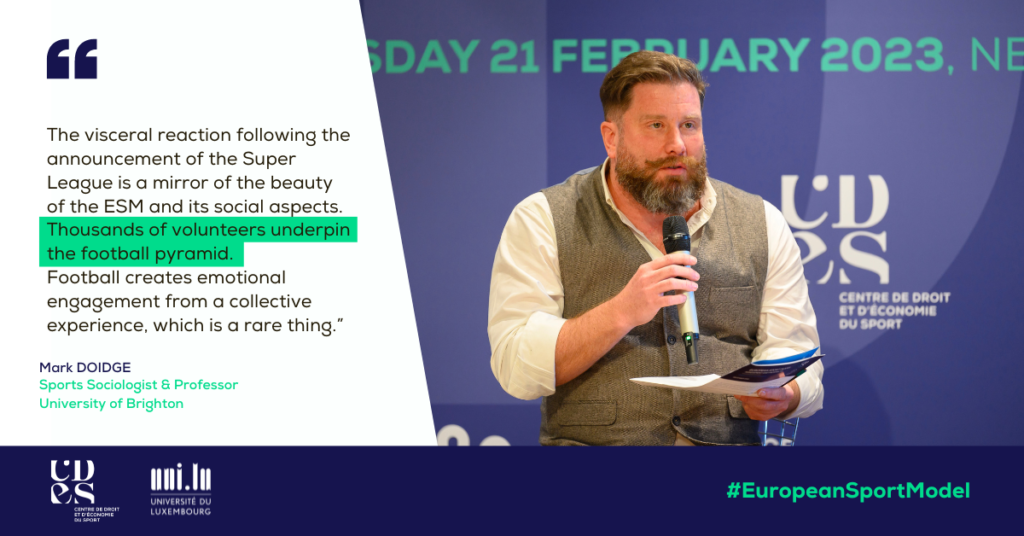
Mark Doidge, sports Sociologist and Professor at University of Brighton, answered questions on the social nature of football. He recalled that the open nature of football is what it makes special – the fact that the team ranked last in the Premier League can beat the first ranked team – is what drives interest in football. He highlighted the importance of volunteers and fans to the ecosystem. It should not be forgotten that fans felt so passionately about the Super League that they came to protest outside stadiums. Fans understood that sport rivals need each other.
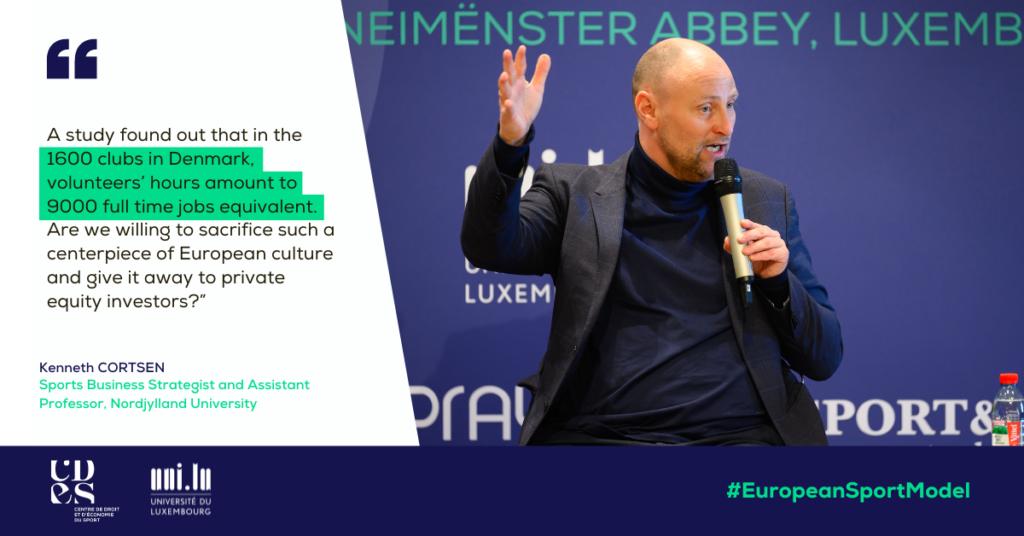
Kenneth Corsten, Sports Business Strategist and Assistant Professor at Nordjylland University in Denmark, stated that the whole world watches European football because the European Sports Model has made it the best in the world. The most attended matches in Europe are in Germany where solidarity amongst the clubs is very strong and membership (50+1 rule) still applies – extending even to bail outs of clubs when they had financial difficulties. In his view, this is why the European Sports Model should be protected.
European Commission: Study on European Sports Model
Relevant link. Click on the button, to read European Commission’s study about the European Sport Model.
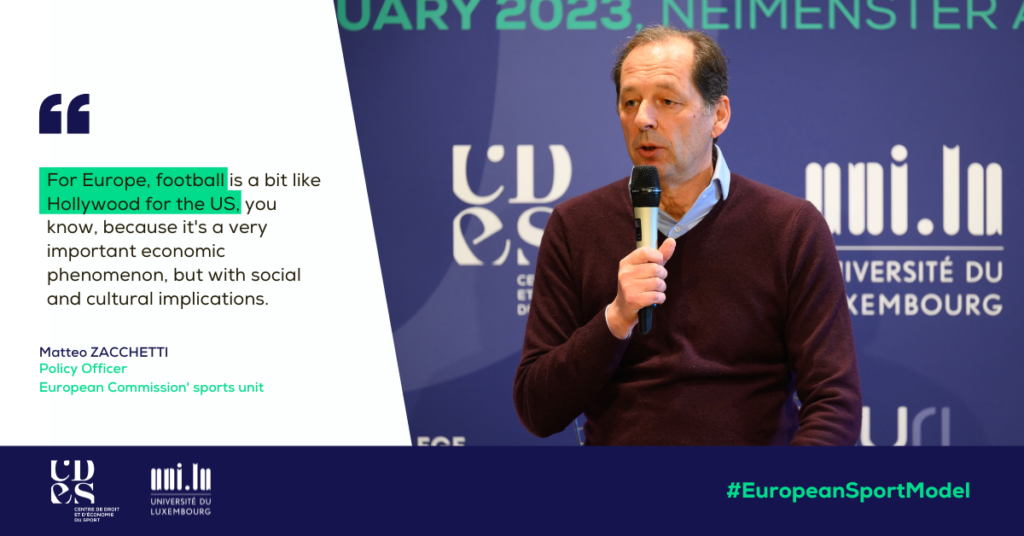
Matteo Zachetti, Policy Officer at the European Commission’ sports unit presented the findings of a report into the European Sports Model. The objective was to provide a snapshot of sport in Europe. Although there are differences between sports, the report does identify key features across many sports notably open competition, solidarity and autonomy. It is therefore possible to say that there is a European sports model. A clear challenge for sport post pandemic is to stop the decline in volunteer activities and to encourage new volunteers. He highlighted incentives being put in place in some Member States to motivate volunteers. In this respect, he commended UEFA for entering into a Memorandum of Understanding with fan groups as they play a crucial role in sport. He concluded by remarking that if the EU Court of Justice agrees with the Advocate General that sport has a constitutional status then this may open up a new ambitious programme for the next European Commissioner responsible for sport.
Panel 2: What is the regime of the European football pyramid under EU law?
Hosted again by Mehreen Khan, Economics Editor of The Times, the second panel discussed the application of EU law to the football pyramid.
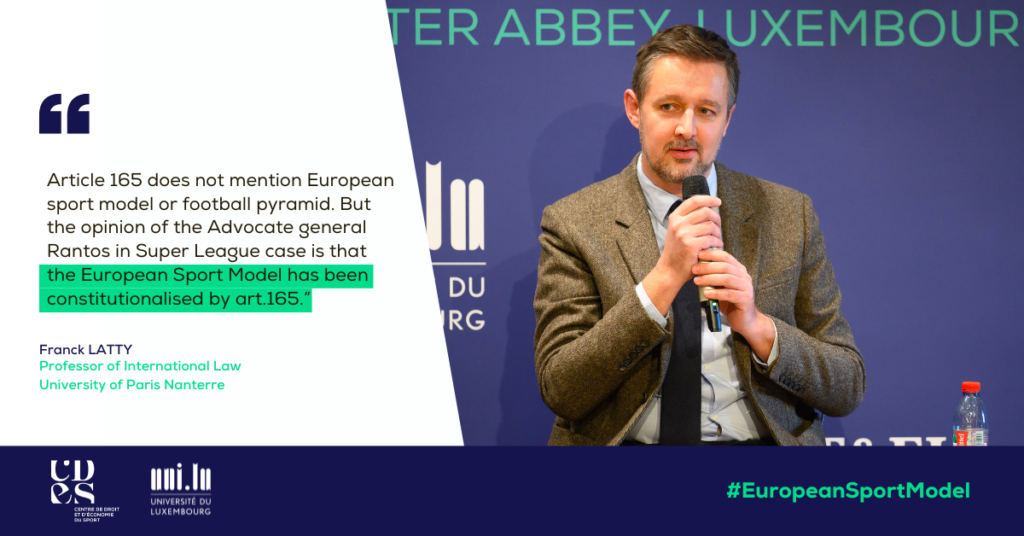
Frank Latty, Professor of International Law at University of Paris Nanterre, noted that there was no mention of sport in the original treaties. The EU Court of Justice had not previously paid much attention to Article 165, only referencing it in passing in the Olympique Lyonnais/Bernard case. If the EU Court of Justice follows the Advocate General then it will give a much more specific meaning to Article 165 on sport.
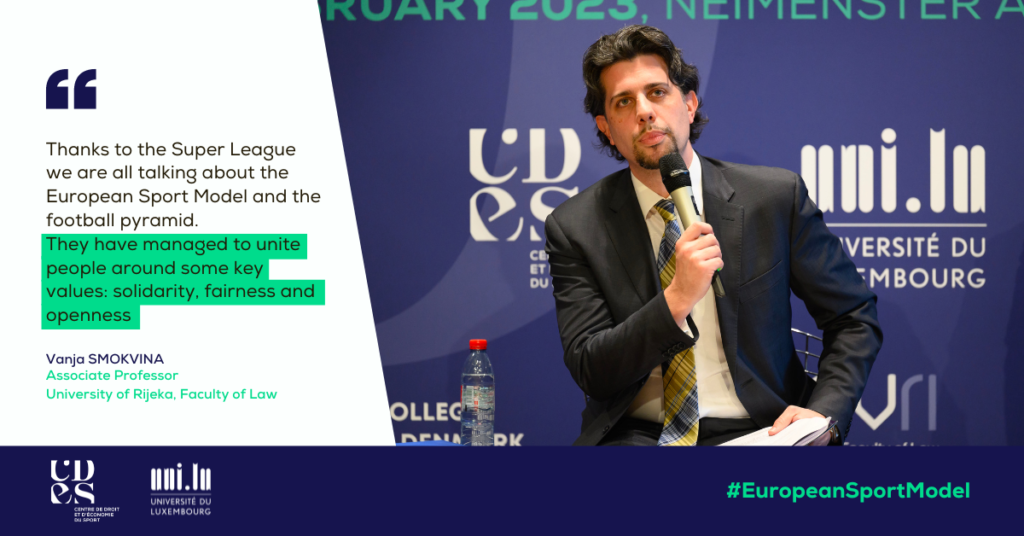
Vanja Smokvina, associate Professor at the Faculty of Law of the University of Rijeka (Croatia), said that fans, small clubs and stakeholders have woken up to the threat to the European Sports Model. He highlighted the situation in basketball where the Euroleague has stifled access to a few top clubs – which is harming the basketball ecosystem across Europe. He also underlined the opacity of the Super League by saying that nobody really knew who was behind this project and the company, contrary to sports governing bodies for whom we perfectly know who are the Presidents, how they are appointed and for what they are accountable.
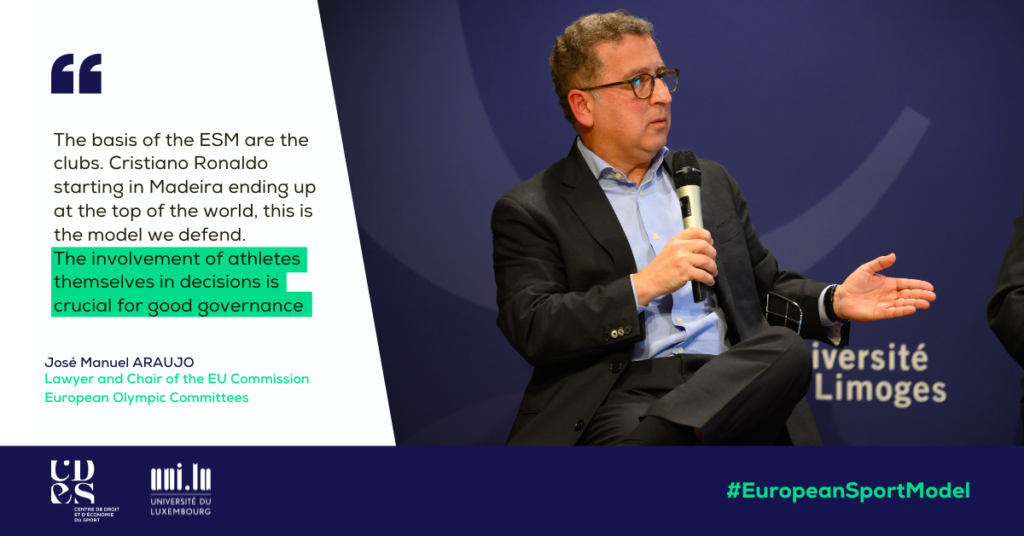
José Manuel Araujo, a Lawyer, General Secretary of the Portuguese Olympic Committee and Member of the committee for EU affairs in the European Olympic Committee, explained that Olympic sports are following the Super League case closely because of its impact for all sports. It is essential that the pre-authorisation rules are upheld so that sports federations can do their work. He said that sports federations need legal certainty and flexibility to regulate sport.
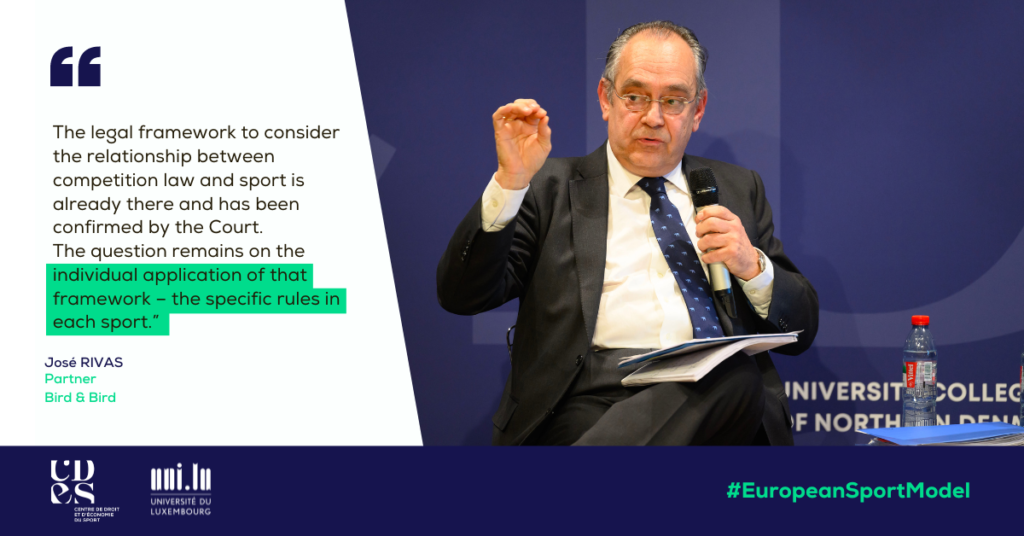
José Rivas, an EU Lawyer, rejected the suggestion that the EU Court of Justice may give sports federations a carte blanche if they follow the Advocate General’s Opinion. In his view, this is not what the Court is being asked to do. Instead, the questions are about the basic functioning of the sports model. He expressed surprise that we are still dealing with such basic issues when the real questions should be on the detail of particular regulations. In his view, these issues have been settled in cases like MOTOE (concerning motorcycling). Indeed, Advocate General Kokott in that case recognised the importance of the pyramid structure for the governance of sport. As such, it seems clear that the rules are necessary and proportionate to the achievement of a legitimate objective. Indeed, it would be strange to authorise an organisation that wants to undermine the entire eco-system. In his view, Article 165 TFEU clearly protects certain values and that must mean something.
The example of boxing was raised as a sport where there are multiple governing bodies. However, it was pointed out that it is not possible for fans to determine who really is the world champion.
Jose Manuel Araujo said that sports governing bodies have nothing to fear from EU law and should apply transparent criteria and to involve athletes and other stakeholders in decision making processes. However, sports governing bodies play a crucial role that cannot be fulfilled by profit making entities. The recent example in tennis was highlighted where the ITF involved a private company, Kosmos, which walked away from the Davis Cup after just a year or two in operation. Sometimes it is difficult to discover who is behind a company – for example there is still little known about A22, the company promoting the Super League. Of course, private companies have a role to play but it cannot just be to cherry pick the best bits of a sport.
Addressing the recent judgment of the Madrid Court of Appeal, which reinstated interim measures upon UEFA, Jose Rivas said it was surprising that the Madrid Court did not take into account the Opinion of Advocate General Rantos. Indeed, there was no mention at all of the governance role of sports federations. There was no requirement, however, under EU competition law to split up the functions of sports federations between their regulatory and commercial functions – the only case where this occurred in a competition case being a unilateral decision by the Federation Internationale de l’Automobile with respect to the organisation of Formula 1. As such, it was legitimate for a sports federation to apply pre-authorisation rules in a proportionate manner.
The panel concluded by agreeing that they remain optimistic for the future of the European Sports Model.
Closing remarks: José Luis da Cruz Vilaça, EU Lawyer and former Judge at EU Court of Justice (2012-2018)
Closing the conference, José Luis da Cruz Vilaça declared his interest in the Super League case as the representative for Portugal in the case. However, his view coincided with those of the Member State he had the honour to represent. As a fan of Sporting Braga, he doubted that this club would ever have been invited to the top table by the European Super League despite successfully qualifying regularly for UEFA Champions League.
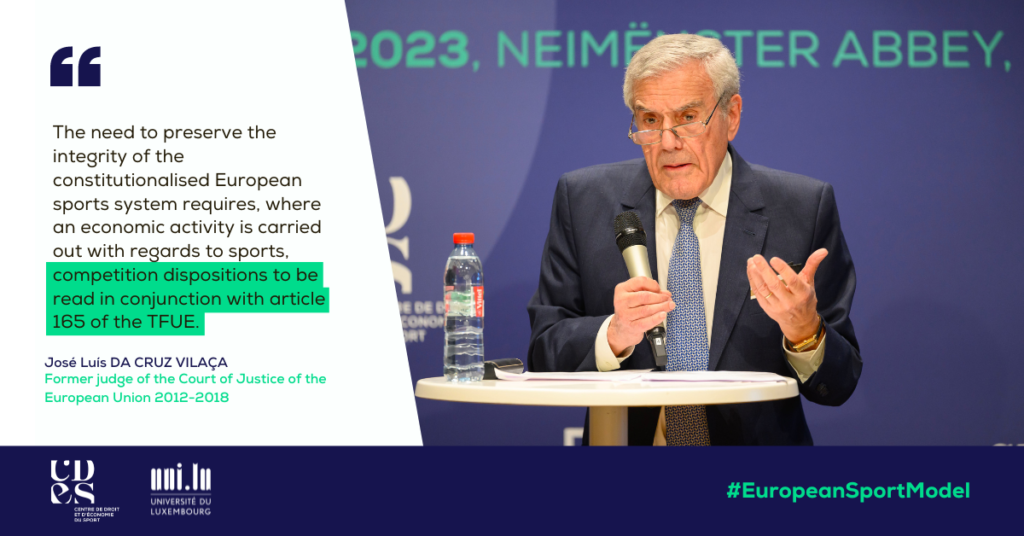
The key point in the pleadings of Portugal concerned the constitutional nature of sport in light of its inclusion at Article 165 TFEU. Article 165 gives inferences that have a meaning. The adoption of the provision on sport implies a change to the legal analysis. Something changed after the adoption of the Lisbon Treaty. It was not by chance that the provision was adopted, but rather the culmination in political views of the EU institutions on the European Sports Model. As a result, his view is that the provision means that sport now has a constitutional dignity. The Opinion by Advocate General Rantos agreed with the position put forward by Portugal and is the first time that the constitutional status of sport been officially recognised by the EU Court of Justice.
The Super League case touches at the heart of sport in Europe. Although he would not be drawn on predicting the outcome, he considered that the analytical tools available to the Court of Justice are well known. The building blocks for protecting the European Sports Model are in Article 165 as it sets out the key values which are to be found in that model.
He considered that UEFA and FIFA need to have the legal tools to conduct sports governance. Of course, EU law does not give sports governing bodies unlimited rights; the European Sports Model is not a lawless territory. However, it is not up to anyone to simply close off the eco-system to a select few. That is why it is valid for UEFA and FIFA to protect the European Sports Model from a hijack attempt by a few rich and powerful clubs.
In his conclusion, José Luis da Cruz Vilaça opined that the EU Court of Justice should take the opportunity to address all elements of the questions, including with respect to proportionality. The issue was not with respect to a national law so there was no reason for the EU Court of Justice not to apply a uniform interpretation on the rules at issue in the Super League case. The risk otherwise is that different national courts will apply different standards of proportionality. He hoped that the Court would come to a balanced view in order to safeguard openness and fairness in sport.
